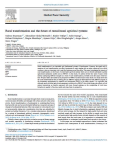Kruseman G., Mottaleb K.A., Tesfaye K., Bairagi S., Robertson R., Mandiaye D., Frija A., Gbegbelegbe S., Alene A., Prager S. (2020). Rural transformation and the future of cereal-based agri-food systems. Global Food Security, 01/09/2020, vol. 26, p. 1-9.
https://doi.org/10.1016/j.gfs.2020.100441
https://doi.org/10.1016/j.gfs.2020.100441
| Titre : | Rural transformation and the future of cereal-based agri-food systems (2020) |
| Auteurs : | G. Kruseman ; K.A. Mottaleb ; K. Tesfaye ; S. Bairagi ; R. Robertson ; D. Mandiaye ; A. Frija ; S. Gbegbelegbe ; A. Alene ; S. Prager |
| Type de document : | Article |
| Dans : | Global Food Security (vol. 26, September 2020) |
| Article en page(s) : | p. 1-9 |
| Langues : | Anglais |
| Langues du résumé : | Anglais |
| Catégories : |
Catégories principales 6.4 - Production Agricole. Système de Production ; 06 - AGRICULTURE. FORÊTS. PÊCHESThésaurus IAMM SYSTEME AGROALIMENTAIRE ; CEREALICULTURE ; CEREALE ; MAIS ; BLE ; RIZ ; EVALUATION DE L'IMPACT ; ZONE RURALE ; ECONOMIE RURALE ; DEVELOPPEMENT DURABLE ; DEVELOPPEMENT RURAL ; PROSPECTIVE |
| Résumé : | Rural transformation is an inevitable and fundamental process of development. However, the speed and dimensions of rural transformation can affect investments in major staples such as maize, wheat and rice, which continue to play an important role in agri-food systems around the globe. This paper investigates the impacts of rural transformation on the future of cereal-based agri-food systems which are not directly addressed in global agricultural assessment models such as IMPACT. In this study, we present several key cases of major cereal systems undergoing different changes as a result of rural transformation processes across the major cereal baskets. We place these case studies in the perspective of IMPACT model scenario study results. Our study shows that the rural transformations that are taking place in different regions are heterogeneous with different impacts on the investment requirements for research and development (R&D) in the major cereals. It is concluded that although results of global agricultural assessment models such as IMPACT show initial large-scale effects on food system interactions, an iterative approach with more focused analyses on the complexities of rural transformation is needed to fine-tune results and place them in perspective. |
| Cote : | En ligne |
| URL / DOI : | https://doi.org/10.1016/j.gfs.2020.100441 |







